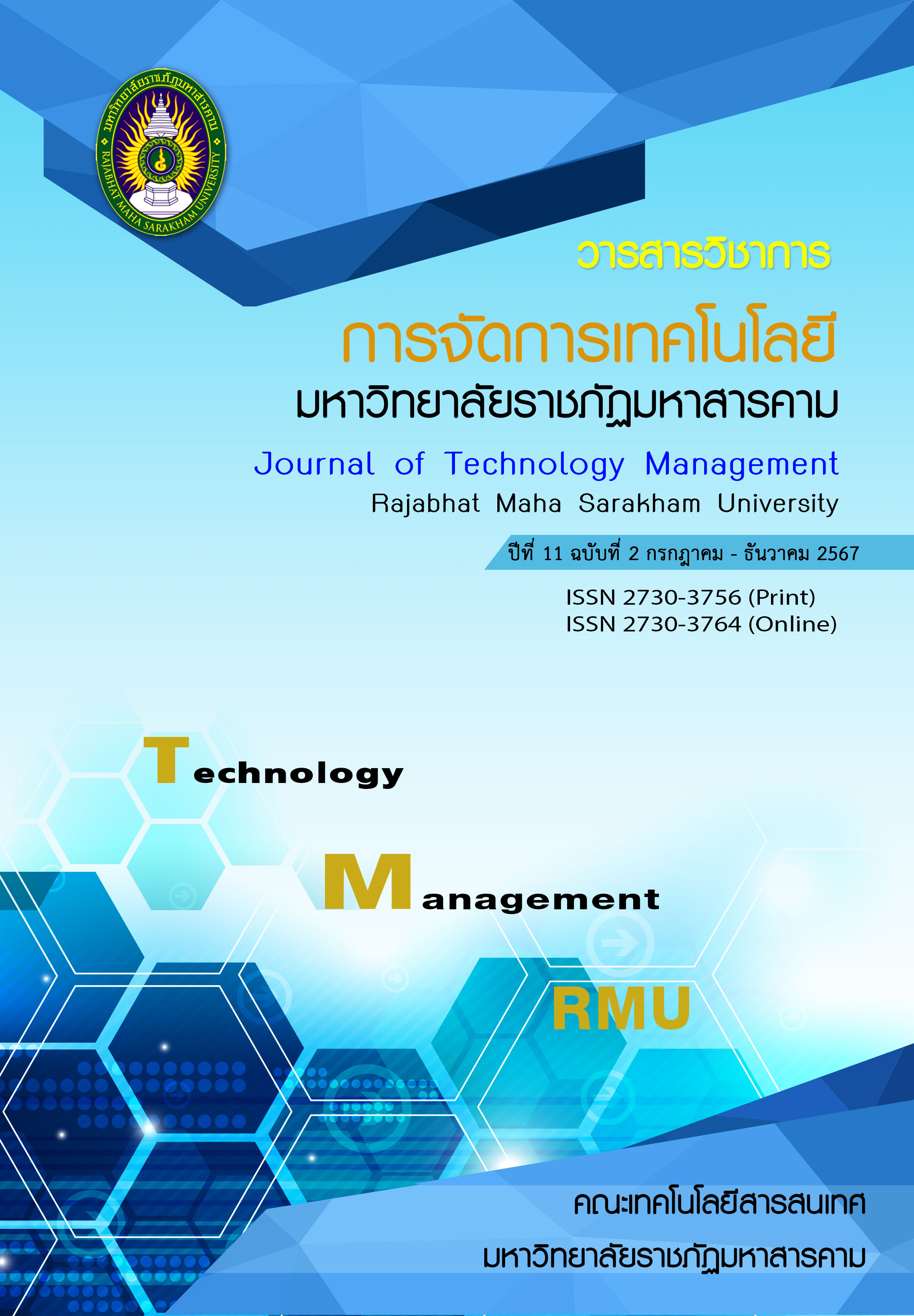การพัฒนาเกม “มักก้า” เพื่อส่งเสริมความเมตตา
Main Article Content
บทคัดย่อ
การวิจัยครั้งนี้มีวัตถุประสงค์เพื่อ 1) ออกแบบและการพัฒนาเกมคอมพิวเตอร์ “มักก้า” เพื่อส่งเสริมความเมตตา และ 2) ศึกษาความพึงพอใจของผู้เล่นเกม “มักก้า” กลุ่มตัวอย่าง ได้แก่นักศึกษาชั้นปีที่ 1 คณะเทคโนโลยีการเกษตรและเทคโนโลยีอุตสาหกรรม มหาวิทยาลัยราชภัฏเพชรบูรณ์ จำนวน 30 คน ด้วยวิธีการสุ่มอย่างง่าย เครื่องมือที่ใช้ในการวิจัย ได้แก่ เกม “มักก้า”และ แบบสอบถามความพึงพอใจของผู้เล่นเกม “มักก้า” สถิติที่ใช้ในการวิจัย ได้แก่ ค่าเฉลี่ยและส่วนเบี่ยงเบนมาตรฐาน
ผลการวิจัยพบว่า 1) การออกแบบและการพัฒนาเกม “มักก้า” เพื่อส่งเสริมความเมตตา พบว่า เกม “มักก้า” ออกแบบตามกระบวนการออกแบบโครงสร้างการเล่าเรื่องและกระบวนการสร้างโครงสร้างการเล่าเรื่อง โดยพิจารณาองค์ประกอบเชิงมโนทัศน์ของเกมในบริบทของการสร้างเกมสวมบทบาท ประกอบด้วย (1) กฎ (2) รางวัล (3) เรื่องราว (4) ตัวละคร (5) สถานการณ์ และ (6) ความสำเร็จตามเป้าหมาย และ 2) ผลการศึกษาความพึงพอใจของผู้เล่นเกม “มักก้า” พบว่า ผลการประเมินเกม “มักก้า” ในภาพรวมอยู่ในระดับมาก ( = 4.31,SD. = 0.76)
Article Details

อนุญาตภายใต้เงื่อนไข Creative Commons Attribution-NonCommercial-NoDerivatives 4.0 International License.
เอกสารอ้างอิง
P. C. Ariyametee, P. P. Pabhakaro and P. Peuchthonglang, “Creating a peaceful community through Buddhism approach,” Journal of Philosophy and Religion, Khon Kaen University, vol. 6, no. 2, pp. 50–74, 2021. (in Thai)
P. Thammarongpreechachai, T. Teerapong, and V.Wongpinpech, “Effects of self-compassion on compassion for others and happiness of volunteers in Bangkok metropolitan regions,” Journal of Human sciences, vol. 21, no. 2, pp. 84–102, 2020. (in Thai)
S. Jittham, “Building happy organization by using the Four Brahma Viharas according to Buddhist psychology,” Journal of MCU Humanities Review, vol. 9, no. 1, pp. 443–451, 2023. (in Thai)
C. Vongareesawat and P. Mahayosanan, “Mental health of student nurse: The applying Dhamma teachings in providing mental health counseling by academic advisor,” Journal of MCU Peace Studies, vol. 7, no. 6, pp. 1805–1818, 2019. (in Thai)
K. Wongkum, J. Dibyamandala and C. Mangkhang, “Moral game–based active learning management to promote good citizenship of elementary school students,” Journal of MCU Peace Studies, vol. 10, no. 2, pp. 737–749, 2022. (in Thai)
C. A. Nagaoka and K. Santawee, “The factors influencing information and digital media literacy of youth in Bangkok,” The Journal of Social Communication Innovation, vol. 7, no. 1, pp. 55–62, 2019. (in Thai)
J. P. Zagal and S. Deterding, “Definitions of ‘role-playing games,’” in Role-Playing Game Studies, New York: Routledge, pp. 19–51, 2018. doi: 10.4324/9781315637532-2.
E. V. Soboleva, E. G. Galimova, Z. A. Maydangalieva, and K. K. M. Batchayeva, “Didactic value of gamification tools for teaching modeling as a method of learning and cognitive activity at school,” Eurasia J. Math. Sci. Technol. Educ., vol. 14, no. 6, pp. 2427–2444, 2018, doi: 10.29333/ejmste/89843.
M. Grande-de-Prado, R. Baelo, S. García-Martín, and V. Abella-García, “Mapping role-playing games in Ibero-America: An educational review,” Sustainability MDPI, Aug. 2020. doi: 10.3390/SU12166298.
P. Dorożyński and K. Dorożyńska, “The role-playing game to increase students’ activity and engagement in the teaching process – A pilot study of research & development campaign,” Currents in Pharmacy Teaching and Learning, vol. 14, no. 8, pp. 1046–1052, Aug. 2022, doi: 10.1016/j.cptl.2022.07.015.
H.-L. Chen and C.-T. Wu, “A digital role-playing game for learning: effects on critical thinking and motivation,” Interactive Learning Environments, vol. 31, no. 5, pp. 3018–3030, Jul. 2023, doi: 10.1080/10494820.2021.1916765.
C. Chen and J. Syu, “Effects of integrating a role‐playing game into a virtual reality‐based learning approach on students’ perceptions of immersion, self‐efficacy, learning motivation and achievements,” British Journal of Educational Technology, vol. 55, no. 5, pp. 2339-2356, 2024, doi: https://doi.org/10.1111/bjet.13436
R. Heinz and P. Prager, “Exploring the use of role-playing games in education,” Master of Teaching Research Journal, vol. 2, 2019.
D. Lombardi, Z. Zeng, and T. Dounas, “Role-playing games and narrative architecture in design methods: A systematic review,” in ASCAAD, 2023, pp. 667–683. [Online]. Available: https://www.researchgate.net/publication/375837735.
D. Reardon and D. Wright, The Digital Role-Playing Game and Technical Communication: A History of Bethesda, BioWare, and CD Projekt Red. Bloomsbury Publishing USA, 2021.
J. P. Zagal and R. Altizer, “Examining ‘RPG elements’: Systems of character progression,” in Proceedings of Foundations of Digital Games, Fort Lauderdale, FL, 2014. [Online]. Available: http://www.fdg2014.org/papers/fdg2014_paper_38.pdf
S. Ivanova, L. Dimitrov, V. Ivanov, and L. Prokopovych, “Using role-playing game for professional skills formation of prospective teachers,” Proceedings of the International Scientific Conference, vol. 1, pp. 195–206, May 2021, doi: 10.17770/sie2021vol1.6180.
L. A. Saraswati, I. Rifai, and M. Farhan, “Role-playing game (RPG) video games and loneliness: An analysis of Finding Paradise narrative,” Lingua Cultura, vol. 16, no. 2, pp. 141–146, May 2023, doi: 10.21512/lc.v16i2.8192.
T. D. Henriksen, “Hvordan kan man lære gennem fiction? Teoretiske perspektiver på læring gennem deltagelse i rollespilsformidlet fiction (How can we learn through fiction? Theoretical perspectives on learning through participation in role-play based fiction),” MSc. Dissertation, Institute of psychology, Københavns Univ., Copenhagen, Denmark, 2002.
T. Anders, “Role-playing games: comparative analysis across two media platforms,” in 3rd Australasian Conference on Interactive Entertainment, pp. 75–82, 2006.
E. Huynh, A. Nyhout, P. Ganea, and F. Chevalier, “Designing narrative-focused role-playing games for visualization literacy in young children,” IEEE Transactions on Visualization and Computer Graphics, vol. 27, no. 2, pp. 924–934, Feb. 2021, doi: 10.1109/TVCG.2020.3030464.
K. Egerton, “Player engagement with games: Formal reliefs and representation checks,” Journal of Aesthetics and Art Criticism, vol. 80, no. 1, pp. 95–104, Jan. 2022, doi: 10.1093/jaac/kpab058.
W. Manosroi, “The develop game Uttaradit Quest Museum for important place study and special product of Uttaradit Province,” Technology and Innovation Journal of Uttaradit Rajabhat University., vol. 1, no. 1, pp. 56–61, 2018. (in Thai)
S. Saoban, N. Khamsawang, W. Khumphung and P. Nuchpho, “Game development to promote cognition of COVID-19,” Science Technology and Innovation Journal, vol. 2, no. 1, pp. 1–12, 2024. (in Thai)
L. Xiaodong, B. Bunlikhitsiri and P. Panthupakorn, “Cultural heritage and game design: An analysis of the creation of the RPG game ‘The Youth Ba Lai,” Journal of Information Science, vol. 41, no. 2, pp. 114–128, 2023, doi: 10.14456/jiskku.2023.13.
R. Likert, “A technique for the measurement of attitudes,” Archives of Psychology, vol. 22, no. 140, pp. 1–55, 1932.
Monchai Tienthong, Statistics and Research Methods in Information Technology. Bangkok: King Mongkut's University of Technology North Bangkok, 2005.
D. F. Polit and C. T. Beck, “The content validity index: Are you sure you know what’s being reported? Critique and recommendations,” Research in Nursing & Health, vol. 29, pp. 489–497, 2006. doi: 10.1002/nur.20147


